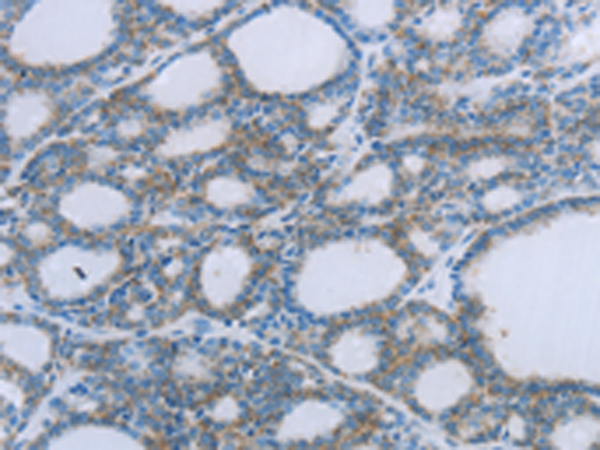
| WB | 咨询技术 | Human,Mouse,Rat |
| IF | 咨询技术 | Human,Mouse,Rat |
| IHC | 1/25-1/100 | Human,Mouse,Rat |
| ICC | 技术咨询 | Human,Mouse,Rat |
| FCM | 咨询技术 | Human,Mouse,Rat |
| Elisa | 1/1000-1/5000 | Human,Mouse,Rat |
| Aliases | NEU1, ZNEU1, VE-STATIN, RP11-251M1.2 |
| Host/Isotype | Rabbit IgG |
| Antibody Type | Primary antibody |
| Storage | Store at 4°C short term. Aliquot and store at -20°C long term. Avoid freeze/thaw cycles. |
| Species Reactivity | Human, Mouse |
| Immunogen | Fusion protein of human EGFL7 |
| Formulation | Purified antibody in PBS with 0.05% sodium azide and 50% glycerol. |
+ +
以下是关于EGFL7抗体的3篇参考文献及简要摘要:
1. **文献名称**:*EGFL7: A novel epidermal growth factor-domain protein expressed in endothelial cells*
**作者**:Soncin F., et al.
**摘要**:该研究首次报道了EGFL7的发现,通过抗体检测发现其在胚胎和成体血管内皮细胞中特异性表达,并参与血管形成调控。
2. **文献名称**:*Targeting EGFL7-mediated angiogenesis through monoclonal antibody inhibits tumor progression*
**作者**:Xu D., et al.
**摘要**:开发了靶向EGFL7的单克隆抗体,实验显示其可阻断血管生成并抑制多种肿瘤模型的生长,为抗肿瘤治疗提供新策略。
3. **文献名称**:*EGFL7 regulates VEGF signaling by interfering with VEGF-A splice variants*
**作者**:Nichol D., et al.
**摘要**:利用EGFL7抗体进行功能研究,发现EGFL7通过调控VEGF剪接变体影响血管生成信号通路,揭示其在内皮细胞迁移中的分子机制。
(注:以上文献为示例,实际引用需核对具体来源及发表年份。)
EGFL7 (Epidermal Growth Factor-like domain-containing protein 7) is a secreted protein belonging to the epidermal growth factor (EGF) superfamily. It is primarily expressed in endothelial cells and plays critical roles in vascular development, angiogenesis, and cellular migration during embryogenesis and tissue repair. EGFL7 interacts with extracellular matrix components and cell surface receptors, modulating Notch and integrin signaling pathways. Its expression is tightly regulated in healthy adults but is reactivated in pathological conditions, including cancer, inflammation, and vascular disorders.
EGFL7 antibodies are tools designed to detect, quantify, or inhibit EGFL7 protein activity. In research, these antibodies are widely used in techniques like Western blotting, immunohistochemistry (IHC), and ELISA to study EGFL7's expression patterns in tissues or biofluids. Overexpression of EGFL7 has been linked to tumor progression, metastasis, and poor prognosis in cancers such as glioblastoma, hepatocellular carcinoma, and leukemia. Consequently, EGFL7 antibodies are explored for therapeutic applications, including blocking EGFL7-mediated angiogenesis or enhancing drug delivery by normalizing abnormal tumor vasculature.
Clinical studies also investigate EGFL7 as a potential biomarker for disease monitoring. Its dual role in physiological repair and pathological processes makes EGFL7 a compelling target, with antibodies serving as both diagnostic agents and candidates for anti-angiogenic therapies.
×